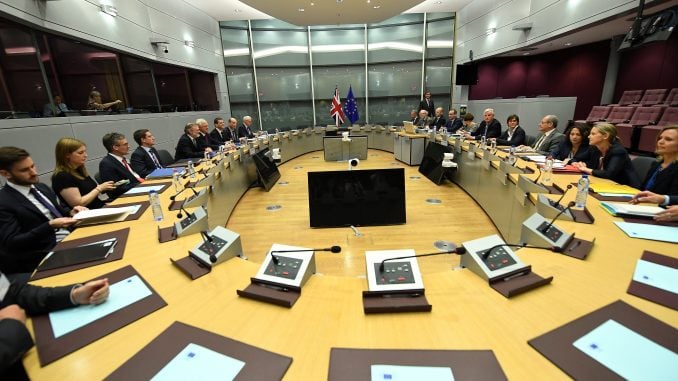
The amusing thing about bureaucracies is that, sooner or later, they make the argument against themselves for you. It is amusing, at least, when it is happening to someone else. Such was the case with the vote in the U.K. to exit the European Union. In the runup to the June 2016 vote, the campaign raged between “remain” and “leave,” with the Leave side claiming Britain had given up too much sovereignty and would be forced to give up more. The Remain side claimed the Leave side was a gang of reactionary crackpots. At the same time, E.U. bureaucrats were I swear I am not making this up writing “ecodesign” regulations for small household appliances that will outlaw “energy-inefficient” toaster and tea kettles. The regulations, which the E.U. delayed revealing until after the vote, will apply throughout the E.U. But no one on the Continent values toast and tea as much as the British do. The Brexit vote was about much more than comestibles, of course. As Brexit negotiations are underway in Brussels, it is clear that the E.U. will go down fighting to keep its continental tentacles far into Great Britain’s affairs. The issue du jour is a British proposal that “offers EU nationals who have lived in Britain for at least five years… ‘settled status,'” according to the Washington Post, “with the right to live, work and access benefits.”The Post, as with most of the eurocentric media, refers to the battle over legal status as “rights,” as if there is a universal human right to live and receive unemployment benefits in whatever country you wish. That’s rubbish, of course. Beyond political semantics, the kerfuffle which the E.U. is using as a pretext to make the exit as slow and painful as possible shows the prescience of those who have opposed the E.U. from the beginning. There’s always a way out if things go awry, the champions of joining the union said. Not an easy one, opponents said. The bureaucracy is proving the eurosceptics right again.On this side of the Atlantic, we have seen some hopeful signs in the fight against the bureaucratic state lately. First, the Trump administration has moved to reconsider Obama-era rules that overstep Congressional authorization. The most high-profile of these is the Waters of the United States rule, the most consequential land-grab in recent memory. Trump has started to undo Obama’s rule, which claimed ridiculously that everyone regulators, lawyers, farmers, environmentalists, everybody had been misreading the Clean Water Act for nearly half a century. Trump’s moves on over-regulation have been promising, but the judiciary has also gotten testy with regulators evading democracy to rule by fiat. In May, a federal appeals court ruled that the Federal Aviation Administration cannot require recreational drone flyers to register and pay a $5 fee every three years. A 2012 law, the court said, prohibited the FAA from regulating drones.Considering the capabilities of today’s drones, registration is probably a good idea. And the fee is just $5. But especially when we agree with unlawful regulations, we must insist the rule of law be followed. The drone rule was not that consequential. But courts finally have begun to look askance at other federal agency actions that have a tenuous basis in law. Although there is a long way to go, what is known as “Chevron deference” may be on the way out. Chevron deference, named for a 1984 Supreme Court case, means that the courts bow to any reasonable agency interpretation of an unclear law. This precedent turns the doctrine of separation-of-powers on its head, making the courts subordinate to the executive branch.While constitutional originalists have been arguing against Chevron for decades, it is liberal judges who may push Chevron off the cliff. Conservatives have long held that one reason to oppose empowering the federal bureaucracy is that the law can change 180 degrees merely by a change of administration. That is happening now, and liberal judges will want to strike down any Trump rule they can. In the process, they may so weaken the Chevron precedent that it becomes meaningless, even absent a Supreme Court decision overturning it. Once again, we see the bureaucracy making the argument against itself. That’s good for democracy. And toast. Drew Elliot is a member of the North State Journal’s editorial board, separate from the news staff. Unlike other newspapers, the North State Journal does not publish unsigned editorials; the author or authors of every editorial, letter, op-ed, and column is prominently displayed. To submit a letter or op-ed, see our submission guidelines.



